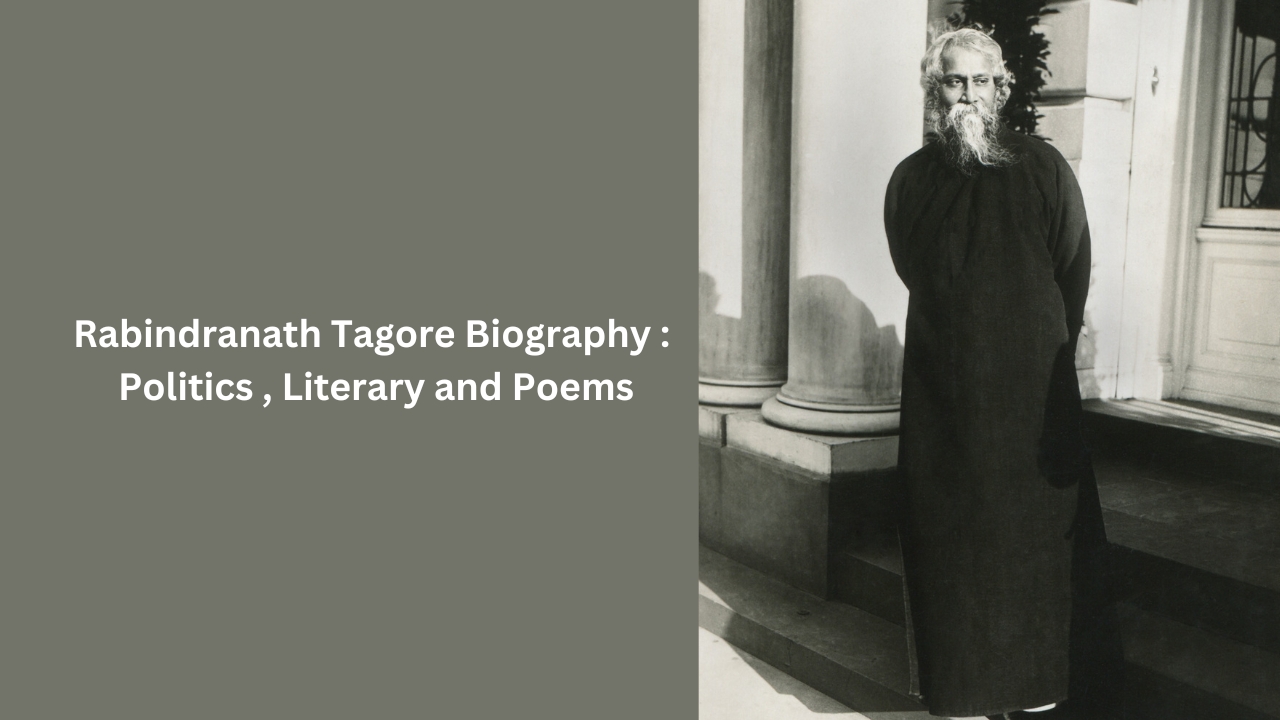Rabindranath Tagore, the revered polymath of Bengal, stands as an indomitable figure in the annals of Indian literature and social reform. His life’s journey, marked by artistic brilliance and unwavering advocacy for human rights, continues to inspire generations worldwide. In this exploration, we delve into the multifaceted persona of Rabindranath Tagore, tracing his life, his impactful political career, and recommending some of his seminal literary works, inviting readers to delve deeper into the genius of this literary giant.
Life and Education:
Born on May 7, 1861, in Calcutta, Rabindranath Tagore was raised in a family renowned for its cultural and intellectual lineage. His father, Debendranath Tagore, was a prominent figure in the Brahmo Samaj, a socio-religious reform movement advocating for the abolition of caste system and promoting education for all. From his early years, Tagore was exposed to a rich milieu of literature, music, and philosophy, shaping his worldview and igniting his creative spark.
Tagore’s education was unconventional, eschewing formal schooling for a more eclectic and self-directed approach. He drew inspiration from nature, literature, and the teachings of his father, cultivating a deep sense of empathy and a keen understanding of human emotions. This formative period laid the groundwork for his future literary endeavours and social activism, setting him on a path of enlightenment and self-discovery.
Political Career:
Tagore’s literary pursuits were inseparable from his commitment to social justice and political reform. Throughout his life, he remained an ardent advocate for India’s independence from British colonial rule, using his platform as a writer and thinker to champion the cause of freedom and self-determination. Tagore’s political activism was characterised by his unwavering belief in the power of dialogue and nonviolent resistance, principles that would later influence leaders like Mahatma Gandhi.
In addition to his anti-colonial stance, Tagore was a vocal proponent of religious and cultural pluralism, advocating for mutual respect and understanding among India’s diverse communities. His vision of a united and inclusive India, where every individual could live in harmony and dignity, continues to resonate in the country’s ongoing quest for social justice and communal harmony.
Literary Legacy:
Rabindranath Tagore’s literary legacy is vast and multifaceted, encompassing poetry, novels, short stories, essays, and plays. His poetry, in particular, remains a cornerstone of Bengali literature, celebrated for its lyrical beauty and profound spiritual insight. Works like “Gitanjali” (Song Offerings), “Kabuliwala,” and “Balaka” continue to inspire readers with their timeless wisdom and universal themes.
Among Tagore’s novels, “Gora,” “Ghare-Baire” (The Home and the World), and “Chokher Bali” (A Grain of Sand) stand out for their exploration of complex social issues and psychological depth. These novels delve into themes of identity, societal norms, and the struggle for individual freedom, offering poignant insights into the human condition.
Music and Visual Arts:
In addition to his literary pursuits, Tagore was a gifted composer and musician. He composed over 2,000 songs, collectively known as Rabindra Sangeet, which remain an integral part of Bengali culture. Tagore’s songs, set to simple melodies and rich in poetic imagery, evoke a wide range of emotions, from joy and longing to introspection and spiritual awakening. Through his music, Tagore sought to bridge the gap between the individual and the divine, inviting listeners on a transformative journey of self-discovery and inner awakening.
Tagore’s artistic talents extended to the visual arts as well. An accomplished painter, Tagore’s artworks reflect his deep connection to nature and his philosophical outlook on life. His paintings, characterised by their simplicity and elegance, offer a window into the artist’s soul, where beauty and spirituality intertwine in perfect harmony.
For those interested in exploring Tagore’s literary masterpieces further, here are some recommended works along with links to read online:
- Gitanjali (Song Offerings): Read Online
- Gora: Read Online
- Ghare-Baire (The Home and the World): Read Online
- Chokher Bali (A Grain of Sand): Read Online
Conclusion:
Rabindranath Tagore’s life and legacy stand as a testament to the transformative power of literature and art in shaping society and elevating the human spirit. His unwavering commitment to social justice, coupled with his unparalleled literary genius, continues to inspire and enlighten people around the world. As we reflect on Tagore’s contributions, let us embrace the values of compassion, tolerance, and human dignity that he espoused, ensuring that his light continues to guide us in our quest for a more just and equitable world.
